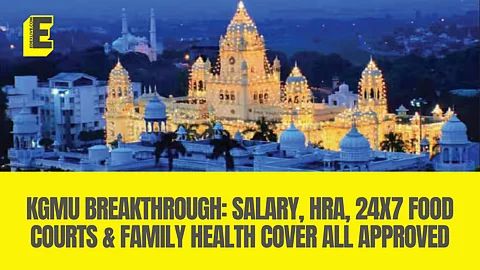

In a landmark decision that could set a precedent for medical colleges across India, the residents of King George's Medical University (KGMU) in Lucknow, Uttar Pradesh, achieved a historic victory when all their Resident Doctors' Association (RDA) demands were accepted during a vice-chancellor-led meeting.
The comprehensive package of reforms includes salary disbursement from the date of joining, Housing Rent Allowance (HRA) or single rooms for all residents, hostel revamp, 24x7 mess and food court facilities, family health coverage, and transportation for outreach programs.
"For a long time we have been told that these are the things that should be available in a medical college," said Dr Divyansh Singh, President of RDA KGMU and National Vice-President of Federation of All India Medical Association (FAIMA), in an interview with EdexLive. "These are not out-of-the-box demands. These are the basics anyone would expect."
Long-standing infrastructure and welfare issues addressed
The victory comes after years of advocacy for basic amenities that Dr Singh argues are fundamental to proper medical education and patient care. He highlighted critical infrastructure gaps that have plagued medical institutions nationwide.
"We say hostels should be air-conditioned because if the residents are staying after hectic 36-48 hour duties, we must be able to relax but do we really find that anywhere?" Dr Singh asked, pointing to the lack of proper rest facilities for overworked medical residents.
Food availability emerged as another major concern across medical colleges. "I don't think most medical colleges have 24x7 food availability. When a resident is working for long periods, how would it be if they do not even get food on time?" he questioned.
The agreement addresses food safety concerns with mandatory police verification and health check-ups for mess employees, along with regular inspections by hostel RDA committees to ensure food quality and resident health.
Housing and healthcare reforms
A significant breakthrough involves housing arrangements, with residents now entitled to either single-seater rooms or HRA if they choose to live outside hostels. Dr Singh criticised the previous practice of housing two residents per room, calling it "a clear violation of basic hygiene and overcrowding criteria."
"How can you put two adults in a single room who are working in the field of public health?" he emphasised.
The new family healthcare provision addresses a critical gap for residents aged 30-40 who often have dependent parents with chronic illnesses. "There was no provision for free health checkups and treatment for parents or dependent family members of residents. We demanded this as well," Dr Singh stated.
Implementation timeline and broader impact
Vice-Chancellor Professor Sonia Nityanand, recent recipient of the Padma Shri, has committed to begin the implementation of the demands from the upcoming Tuesday, June 10, with formal orders to follow from the administration office, the medico reports.
"Our current VC, she is more proactive... she understood our demands finally and she promised to work on fulfilling them," Dr Singh acknowledged.
The victory at KGMU, described as "one of the most premier institutes of India," could have far-reaching implications for medical education nationwide. "If KGMU is missing all these facilities, you can understand the state of other medical colleges of India," Dr Singh observed.
Patient care connection
Dr Singh drew a direct connection between resident welfare and patient safety, noting that overworked, poorly rested doctors pose risks to patients. "Not only do they tend to underperform, they might also put patients' lives at risk, in extreme cases," he explained.
The reforms also aim to address increasing patient aggression toward resident doctors. "We at least have to provide them with the basic amenities that can empower them to do their work well and to take care of their patients well," Dr Singh emphasised.
New facilities for residents
The agreement includes several new facilities:
24x7 exclusive cafeteria floor in the main 1905 building for residents and doctors
New food court in front of SP Hostel
Bus service for community outreach residents visiting centers in Mati, Banthra, and Sarojini Nagar
Establishment of Hostel RDA committees for individual hostel issues
Enhanced security with CCTV, guards, and police coordination
Power backup and subsidised electricity in hostels
Campus road repairs and action on monkey/dog menace
The comprehensive nature of this agreement represents a significant milestone in the ongoing struggle for resident doctors' rights and could serve as a model for similar institutions across the country.
